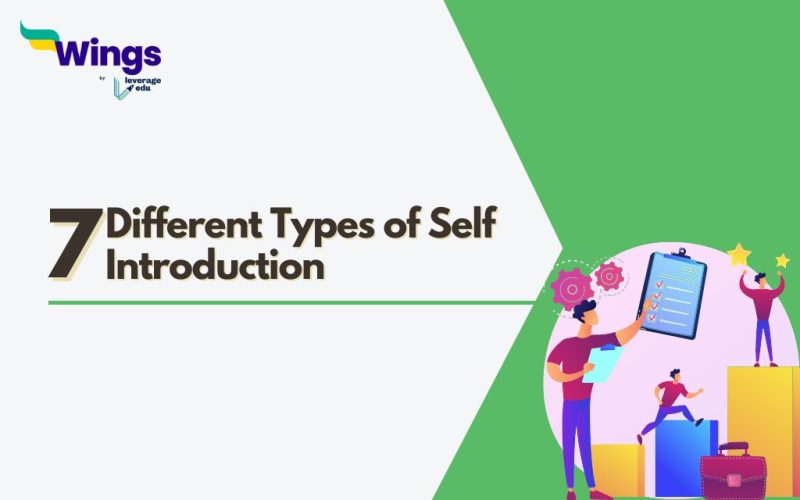Different types of Self Introduction: Self Introductions are considered to be brief statements or introductions to oneself in front of others, where you are talking about yourself, who you are, what you do, and why are you giving this self-introduction. There are various types of self-introductions, which mostly depend on your objective of giving your interview.
Self-introductions can be used in different ways and situations, like an academic introduction, job interview, social gathering, business or work-related meeting, etc. Self-introductions are a way of introducing yourself in front of new people and establishing a relationship or connection with them. In this article, we have highlighted 7 different types of self-introduction.
This Blog Includes:
Formal Self-Introduction
A formal self-introduction includes the candidate’s brief information including name, title, and brand or organisation’s details. formal introductions are mostly used in a business or professional environment.
Here is an example of a formal self-introduction-
‘Good morning Sir/Ma’am, my name is [Your Name]. I am a young professional in [Your field’s name] and have a work experience in [Your Field]. I have completed my education from [Institution’s Name (s)]. I have previously worked with [Name of Organisation/ Clients], and I have developed strong skills [highlight your skills]. I am excited to work with your organisation and look forward to hearing from you. Thanks for having me here today.
Also read – How to Prepare for an Interview
Personal Self-Introduction
Personal self-introductions are given to highlight your career objectives, skills and abilities and things which you are good at. A personal self-introduction aims to create a positive first impression and give others a sense of who you are and what you have to offer. Personal self-introduction generally starts with a friendly greeting, like a ‘Hi’ or ‘Hello’ and state your name and a little bit of information about who you are and what are your interests.
You can add some of your personal information, depending on the situation and the audience to which you are giving your personal self-introduction. Try to avoid oversharing when giving a personal self-introduction and keep it brief.
Social gatherings or settings like meeting people in public or acquaintances require you to give a social self-introduction. A social self-introduction requires you to share your personal information, such as who you are, where you come from, what is your profession, and what plans for the future you have.
Confidence is the key when it comes to giving a social self-introduction. Try to make proper eye contact, speak clearly and confidently, give a gentle smile to show that you are welcoming and approachable, keep it simple, maintain a proper body posture, and ask relevant questions. You can use your humour to make your introduction more interesting. And if face any struggle when talking in social situations, try to rehearse beforehand and be well prepared.
Academic Self-Introduction
Academic self-introductions are somewhat similar to formal introductions but are generally used in academic settings or environments. When you are introducing yourself to a fellow classmate/ student or your teacher, an academic introduction will be used here. In this introduction, you will have to add your name, academic background and program, your career objectives and research interests.
Also read – Self Introduction For A Job Interview
Online Self-Introduction
Online self-introductions are used in online settings, such as social media or online forums. This can include sharing your name, interests, or a brief bio to help others get to know you. In this digital world, almost every organisation recruits new employees by conducting online interviews. This is beneficial to both the organization and the person giving the interview, as both sides will save time and can talk more productively in less amount of time.
Elevator Pitch Self-Introduction
An elevator pitch self-introduction or interview is a concise summary of your experience, career goals and skills, which are mostly used in networking situations and job interviews. This type of self-introduction generally has a time limit (30 to 60 seconds), where you must highlight the best details about yourself to catch the interviewer’s attention. The name elevator pitch is derived from the time you generally spend in an elevator or similar situation.
Creative Self-Introduction
Creative self-introductions allow you to make a unique and memorable introduction that captures the audience’s attention and makes a lasting impression. To sound your interview interesting and attractive, you can highlight a creative story or any skill you’ve used in some situations, use your humour to interest people, use a metaphor or a catchphrase which suits your personality, etc. Try to make your self-introduction as creative as possible if you want other people’s appreciation.
Explore More:

FAQs
Ans: Here are the different kinds of self-introduction:
1. Elevator Pitch Self-Introduction
2. Creative Self-Introduction
3. Online Self-Introduction
4. Academic Self-Introduction
Ans: An elevator pitch self-introduction or interview is a concise summary of your experience, career goals and skills, which are mostly used in networking situations and job interviews. This type of self-introduction generally has a time limit (30 to 60 seconds), where you must highlight the best details about yourself to catch the interviewer’s attention.
Ans: A social self-introduction requires you to share your personal information, such as who you are, where you come from, what is your profession, and what plans for the future you have.
For the latest blogs on Interview Preparation, Careers and more, follow the Leverage Edu website and YouTube channel.
 One app for all your study abroad needs
One app for all your study abroad needs














 45,000+ students realised their study abroad dream with us. Take the first step today.
45,000+ students realised their study abroad dream with us. Take the first step today.

